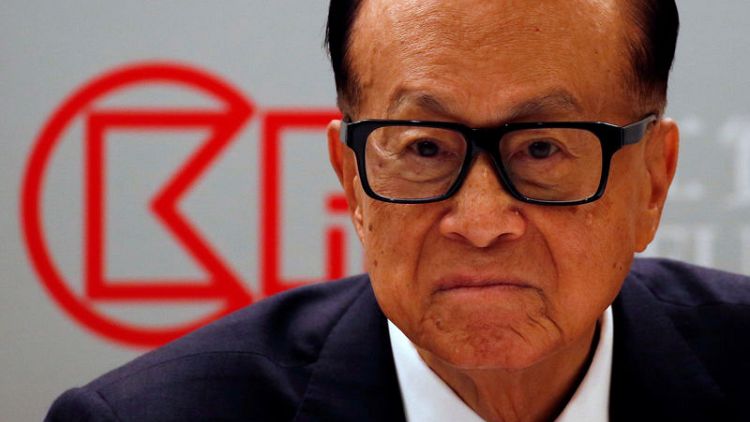By Tom Lasseter, Farah Master, Clare Jim and Keith Zhai
HONG KONG (Reuters) - Li Ka-shing, the city’s most prominent tycoon, said he is getting used to “the unfounded verbal and text punches” thrown at him in recent years.
Li has faced withering attacks from mainland China and pro-Beijing forces in Hong Kong, including during the protests that have engulfed the city since early June. After the 91-year-old billionaire in September called on both the authorities and protesters to exercise restraint, he was accused of “harboring criminality” by the Chinese Communist Party’s central legal affairs commission in Beijing. A pro-Beijing trade union leader in Hong Kong posted a Facebook item mocking him as the “king of cockroaches.”
“In the world of social media, some people are hard at work in sowing toxic doubts and disinformation to undermine trust,” Li told Reuters in a statement. “It is hard not to be drawn into controversies [in] these times.”
Li was responding, in writing, to questions from Reuters for a special report on how Beijing’s attitude toward Hong Kong’s tycoons has hardened under President Xi Jinping. While the city’s rich were courted by China’s leaders for many years, Xi has made it clear he expects them to play their part in helping the central government maintain stability in the city.
The full special report can be read here and here https://reut.rs/2qFXLcN.
The Chinese president delivered that message to Hong Kong’s tycoons during a 2017 meeting in the city. Asked what he thought Xi expected from the city’s wealthiest people, Li pointed to his charitable works.
“I founded a philanthropic foundation in 1980 and have given my utmost support to education, medical research and services,” Li said. “At the time, I have already committed a third of my personal wealth. Around 80% of my foundation’s projects are in the Greater China area. The total contributions have already exceeded HKD 26 billion ($3.3 billion).”
The protests in Hong Kong, which have become increasingly violent, erupted over a bill proposed by Carrie Lam, the city’s leader, that would have allowed for people to be extradited to mainland China. Private wealth managers have told Reuters that the bill, which was scrapped in early September, concerned some of their clients.
“The bill has been withdrawn, there is no point doing forensics on it,” a spokesperson for Li said in response to a question about how the tycoon viewed the extradition bill and whether he saw it as being targeted at Hong Kong’s wealthy.
China’s foreign ministry declined to answer questions for the story. The Hong Kong and Macau Affairs Office did not respond to questions from Reuters.
The protests have also been driven by what many in Hong Kong see as increased meddling by Beijing in the affairs of the city, which enjoys a high degree of autonomy under an arrangement in place since the 1997 handover from Britain.
Li was asked for his thoughts about the view that mainland control of Hong Kong is growing.
“There are many differing opinions on ‘one country, two systems’ but the road we are on is fine,” Li’s spokesperson said. “It requires a tangible commitment from both sides, calls for institutional innovation and not a merger.”
In 2015, Li faced criticism from the mainland after he folded his Hong Kong-registered Hutchison Whampoa Ltd and another company into firms incorporated in the Cayman Islands. At the time, the main mouthpiece of the Communist Party, the People’s Daily, said in a commentary posted on social media that Li was happy to “enjoy the benefits when things are good” but couldn’t be counted on in tough times.
Asked about that criticism, Li told Reuters: “When you are my age, you will know how to cut through the noise. I don’t know if it is a concerted effort, but I am getting used to all the unfounded verbal and text punches.”
Since 2015, Li's companies have been involved in acquisitions globally worth more than $70 billion. Less than $1 billion of that was in Hong Kong or mainland China, according to a Reuters analysis of Li’s deals worth $500 million or more.
In that same period, Li divested from four companies in the Hong Kong-China region, totalling more than $11 billion. Reuters calculated these tallies using figures from Dealogic, a financial data provider, involving deals by Li’s companies worth $500 million or more, including debt.
Asked about those numbers, the spokesperson for Li said that among Hong Kong companies, his group remains the largest investor in the mainland.
“We have many projects in China,” the spokesperson said. “We are always keen to pursue great investment opportunities all over the world.”
(Reporting by Tom Lasseter, Farah Master, Clare Jim and Keith Zhai. Additional reporting by Sumeet Chatterjee, Greg Torode and Anne Marie Roantree in Hong Kong. Editing by Peter Hirschberg.)
